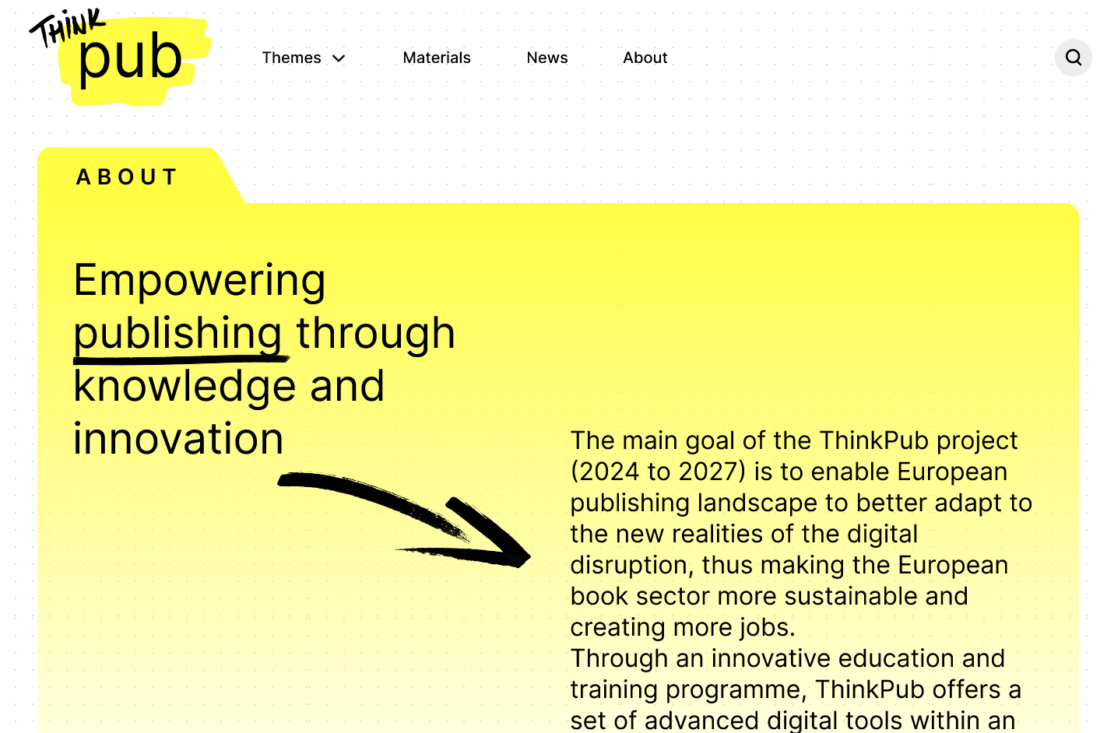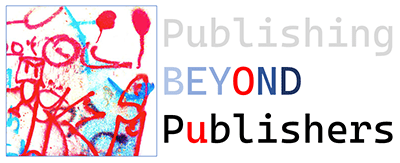Global 50 CEO Talk 2025
Two Unlikely Publishing Leaders Spotlighted at the Frankfurt Book Fair
A discussion on strategy in book publishing – Powered by Zebralution!
How Núria Cabutí, CEO at Penguin Random House Grupo Editorial, and Chantal Restivo-Alessi, CEO International at HarperCollins Publishers, excel globally in their respective unconventional book markets.
The Gobal 50 CEO Talk 2025, held in partnership with the Frankfurt Book Fair, will take place on Wednesday, October 15, from 14:00 to 15:00 at the International Stage (Hall 5/6, level Via).
The session will explore the outstanding strategic visions that drive two of the largest book corporations, HarperCollins Publishers and Penguin Random House Grupo Editorial, as they successfully perform in markets that require both a bold mix of digital innovation and solid handling of highly segmented audiences.
HarperCollins identified the enormous potential for international expansion in 2014 with its acquisition of Harlequin, expanding its direct publishing operations to 15 foreign language markets. It has since grown international trade publishing by more than 750%.
Penguin Random House Grupo Editorial demonstrated how to reach out consistently to Hispanic audiences beyond the Spanish peninsula, from Argentina all the way north to the United States, and yet with highly specific local and regional tastes and author preferences.
Both companies succeeded in their ambitions only by implementing a mix of distributed market approaches, strong centralized strategic management, and an innovative mindset open to using digital workflows and delivery solutions to meet their complex goals.
We are thrilled to announce that this event is powered by Zebralution!
About the Global 50 CEO Talk:
The Global 50 CEO Talk is prepared in conjunction with the Global 50 Publishing Ranking, which has mapped the 50 largest publishing corporations each year since 2007.
For details, see www.wischenbart.com/en/markets-reports .
The event is co-organized by Ruediger Wischenbart Content and Consulting (www.wischenbart.com) and Carlo Carrenho Publishing Consulting (www.carrenho.co ), together with Digital Publishing Report (www.digital-publishing-report.de).
About Núria Cabutí
Núria Cabutí is a native of Barcelona and graduated in Economic Sciences from the UAB. She holds a Bachelor of Arts in Business Studies from Oxford Brookes University and an MBA from IESE. She got her start in the publishing sector in 1992, and since then, she has developed her professional career within the publishing group. In 1998 she was named Director of Marketing at the Plaza & Janés imprint. Following the merger that created Random House Mondadori in 2001, she was named Director of Marketing and Communications. In 2003, she was appointed Editorial Director of the Children’s and Young Readers Division and later took on the direction of Debolsillo as well. Since 2010, she was the CEO of Random House Mondadori. She was appointed CEO of Penguin Random House Grupo Editorial in 2013, and she is a member of the Penguin Random House International Board. Since 2021, she is also a member of the Supervisory Board of Bertelsmann. She is part of the Board of Cercle d’Economia and the Advisory Board of José Ortega y Gasset -Gregorio Marañon Foundation.
Contact at Penguin Random House Grupo Editorial:
Carlota del Amo (carlota.delamo@penguinrandomhouse.com)
About Chantal Restivo-Alessi:
Chantal Restivo-Alessi is Chief Digital Officer and CEO, International Foreign Language, for HarperCollins Publishers, leading the company’s global digital strategy and foreign language publishing program. She works with each division around the world to manage commercial relationships with new and existing digital partners, grow digital revenues, and oversee the company’s developing foreign language publishing program.
Contact at Harper Collins International:
Erin Crum (Erin.Crum@harpercollins.com )
Photo credits: (c) by Penguin Random House and Harper Collins respectively.
What is a book
What is a book, really?
Most would agree that the digital copy of a printed book fulfills all the requirements to be called a book, as it was defined by UNESCO back in 1964:
“…a non-periodical printed publication of at least 49 pages, exclusive of cover pages, and published in a country and made available to the public.”
But are all these items in the showroom of Yuewen – or “China Literature” – in a show room in Shanghai books as well?
Yuewen evolved over more than 20 years from a tiny, experimental writing platform to a 1 billion US$ company, the largest and hugely popular self-publishing platform in Shanghai, China.
Many stories were started here, and subsequently appeared in other format – as printed books, or animations, serialized stories, feeds on the smartphones of kids, you name it

In late May 2025, I had the pleasure to explore that simple question of “What is a book” – and why does this matter? – at the Readmagine conference in Madrid.
A short version of my presentation can be downloaded here.
A video of my presentation and an extended version of my slides will be added to my reports later on.
ThinkPub – Innovation in Publishing
…and how to professionally learn about it! > Proudly announcing a project to sustain professional trainings on innovation for European publishers – supported under Creative Europe and the Austrian Government.
The main goal of the ThinkPub project (2024 to 2027) is to enable European publishing landscape to better adapt to the new realities of the digital disruption, thus making the European book sector more sustainable and creating more jobs. Through an innovative education and training programme, ThinkPub offers a set of advanced digital tools within an online “Library of Digital Learning Objects”.

Photo: ThinkPub 2024
ThinkPub is strategically focused on five key areas: Managerial Innovation, Emerging Technologies, Marketing Innovation, Reading and Translation.
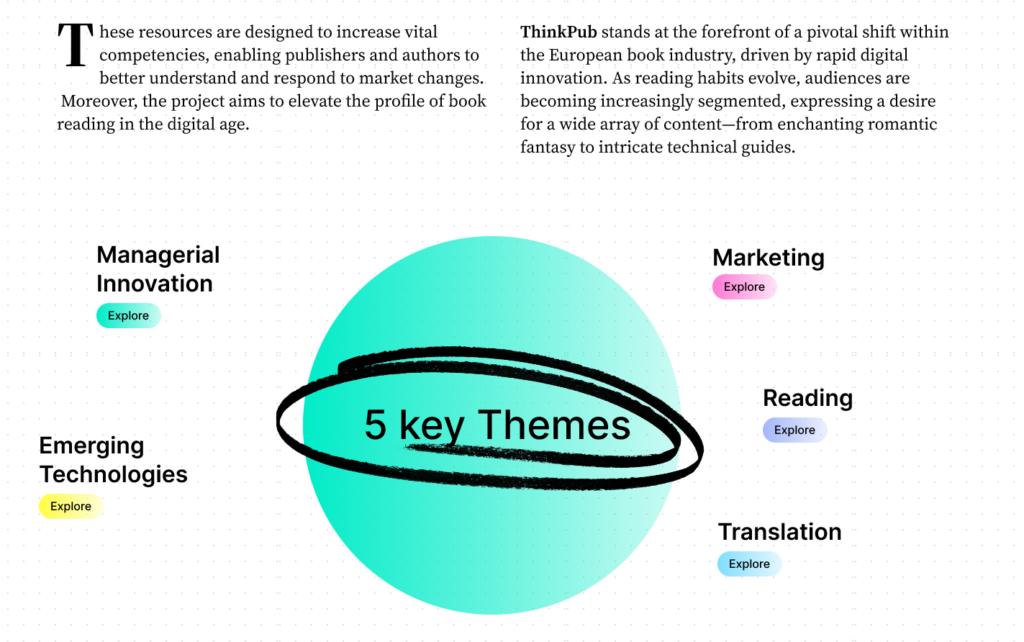
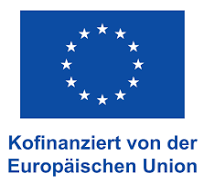

ThinkPub is operated by a consortium of 12 European partner organizations, including Ruediger Wischenbart Content and Consulting in Austria, and coordinated by Beletrina publishing in Slovenia.
The project is co-financed under the Creative Europe programme of the European Union. The Austrian contribution is sponsored by the Federal Ministry of the Republic of Austria – Arts, Culture, Civil Service and Sport.
The Suhrkamp Crisis
Context and perspectives for the book business.

What is the abrupt change of ownership at Suhrkamp Verlag all about?
How surprising was the upheaval?
What does this mean for the book and publishing business as a whole?
(Deutsche Fassung hier)
It was a shock. Suhrkamp, the publishing house that has shaped the German-language cultural landscape like no other institution for decades, is being taken over by a former DIY store manager. has abruptly withdrawn from the company, after having sold the old family villa shortly before Unseld’s 100th birthday.
1 Suhrkamp and the German book market: an assessment in figures
However, this development is not really surprising, at least if you take a closer look at the background and the environment.
Among the 100 largest publishers in Germany, Austria and Switzerland, Suhrkamp was in 46th place with a turnover of 35.4 million euros – well behind other important cultural publishers such as Rowohlt (25), S. Fischer (27), Ullstein (34) or Carl Hanser (41st place – which also includes the Viennese publisher Zsolnay Verlag).
Among Suhrkamp’s 10 best-selling fiction authors in the decade from 2011 to 2020 are just two names of living German-language writers – namely the Austrian Robert Menasse (in 6th place) and Lutz Seiler from Germany (in 8th place). Other top places go to Elena Ferrante (1), Hermann Hesse (2), Isabel Allende (3), Max Frisch (4) and Bertold Brecht (9). (Analysis rw, based on data from Media Control)
There is no published data on the publishing company’s profits or losses. However, turnover has remained constant for a dozen years with slight fluctuations of around 35 million euros – which, however, corresponds to a loss in value of around a fifth once inflation is taken into account.
Around half of all sales are generated with comparatively expensive hardback editions. Digital editions (i.e. e-books and audio books) and the sale of licensing rights contribute just 15 percent to Suhrkamp’s turnover. (The German trade magazine Buchreport last obtained and published this data from Suhrkamp for the 2022 financial year).
Of course, the question now arises: How else is a publishing house supposed to earn money if not by selling hardcover first editions and inexpensive paperbacks, which contribute around a third of Suhrkamp’s turnover?
Firstly, a look at the German book industry over the past 15 years or so:
Most published industry statistics proudly emphasize how ‘resilient’ – i.e. stable and robust – the book business is. This includes sales figures that are reasonably stable. However, this is only true as long as the effects of inflation are ignored. Between 2019 – the year before the Covid-19 pandemic – and 2023, the book market turnover increased by 1.6 percent. In the same period, however, there was inflation of 16.9 percent, which is not taken into account in this calculation. In real terms, the book market in Germany has therefore shrunk considerably. The number of books sold to customers – i.e. the number of copies – fell by 8.4 percent between 2019 and 2023. (Calculations based on statistics from the German Publishers and Booksellers Association)
The long-term comparison is even more drastic. An analysis of the number of copies sold from 2011 to 2020 shows that this figure has been falling linearly and evenly for more than a decade, especially in the segment of printed book titles that are particularly successful and therefore economically particularly important for publishers. Even the pandemic has left virtually no mark on this long-term trend. (Analysis by the author, based on data from Media Control)
This means that the average paid circulation per title has fallen continuously. In the last 5 years in particular, however, the costs for publishers – especially for paper, printing and infrastructure – have risen significantly. This threatening gap has been compensated for by increases in the retail prices of books. In a generally tense economic climate, however, all consumers are becoming increasingly cost-conscious and are cutting back on certain purchases. Obviously, this also includes books.
This was particularly noticeable in ‘brick-and-mortar’ – i.e. traditional – bookstores, whose sales fell by 14.5% between 2019 and 2023. However, Thalia, which is by far the largest bookstore chain, actually grew even further. This is why this very sustained shift has primarily affected small independent bookstores and smaller local chains.
There are no meaningful figures on the development of Amazon. But there are no signs of a decline in Amazon’s role. This is all the less so as it is clear to see how the digital book business in particular – especially outside of online purchases of printed books – is expanding strongly at Amazon.
This “digital business” is an increasingly diverse mix of self-publishing by authors who use the services of “KDP” (“Kindle Direct Publishing”) and consumers who are also increasingly using subscription services such as Kindle Unlimited or various subscriptions to Amazon’s audiobook arm Audible for certain parts of their book consumption.
In short, the territory of the traditional book business that Suhrkamp has long occupied so confidently and as the ‘top dog’ – as the publisher that can score points through its market position and cultural reputation for the ‘highest quality’ offering in terms of the symbolic value of its authors and their books – is under massive pressure to change.
2 Are there alternatives?
Finding one’s role in this ‘new world’ of books – regardless of the format or format – and shaping it successfully in the long term is a complex challenge.
Well, to take a deliberately extreme counter-example: The publishing house Bastei Lübbe, which is also very familiar with internal business crises, is currently managing this feat quite well.
Bastei Lübbe’s revenues are currently distributed comparatively evenly between printed books and e-books, audio books and other offerings of all kinds of ‘reading fodder’ – because, of course, it is largely not about high literature or complex social analyses.
The publishing house, which was founded as a booklet publisher in 1949 – Suhrkamp was launched just one year later, in 1950 – is now comparatively broadly positioned, ranging from international bestseller stars such as Ken Follett to LYX, a special department for romance novels driven by influencers via Tik Tok – i.e. a modern, digital version of the earlier booklets, which are still available on the side – to a mixed operation such as Community Editions, which is positioned at the interface to computer games and all kinds of digital entertainment.
However, this deliberately extreme contrast between the “Suhrkamp culture” ingeniously staged by Siegfried Unseld in his heyday on the one hand, and the colorful trash mix on the other, illustrates a very serious upheaval that book and publishing companies as a whole have to face today:
Building a stable cultural enterprise solely with books for a narrow target group of educated, urban, German-speaking upper middle class people is a very shaky concept.
However, the reason behind this is not – as is often lamented – that “young people in particular no longer read, but just stare at their cell phones”.
Rather, our societies have become much more diverse and complex since the 1960s and 1970s.
3 How much have society and the target audience for books changed?
Our societies have become much more diverse.
The various population groups with a migration background – including a considerable number of educated people, many of whom were born, raised and socialized here – are virtually absent from the range of books offered by publishers and booksellers.
But the general media culture and its offerings have also become much more fragmented and broader.
The Tik Tok boom among young people is the only exception so far, as the book industry has now realized how well hashtags such as #booktok can be used to communicate and sell printed, beautifully designed books.
However, the multitude of digital platforms is much more colorful than just Tik Tok. The boom in audiobooks makes this clear – and only gradually are we beginning to realize that these new, entirely digitally produced and distributed audiobooks are often distributed in combination packs with other content, by subscription and not primarily by purchasing the individual title.
But of course there is also the deliberately and radically unadapted option as a business model: to resist this, even to oppose it and to deliberately set a clear edge and line and say: I only produce high-quality literature, culture and science. Period!
But this is precisely where it is essential to position oneself in a very modern and contemporary way in terms of conception, production, internal workflows, right through to sales and the perfect approach to very precisely defined target groups, and to do this with all the means that today’s – predominantly digital – means of communication make possible.
One such example is – not entirely coincidentally – the British publishing house Bloomsbury. Yes, exactly, the publisher that brought Harry Potter into the world in 1997 after dozens of other publishers had rejected J.K. Rowling’s first manuscript.
Harry Potter still contributes to Bloomsbury’s continued success and growth – but not alone, and not by magic. Rather, publishing house founder Nigel Newton puts it quite pragmatically, but also confidently:
“This dramatic increase arises from our entrepreneurial diversification strategy, which has forged a portfolio of portfolios combining consumer and academic publishing across formats, territories and subject areas, a resilient model delivering long-term success.” (The Bookseller, 23 May 2024)
Here, too, a clear counter-program to Suhrkamp’s previous strategy is brought to the point. After all, in times of profound change, insisting on a great portfolio alone can only lead to paralysis.
4 What happens next?
There are at least two striking details in the somewhat sparse reports on the upcoming change between the Unseld-Berkéwicz family and the new 100 percent owner Dirk Möhrle:
An “annual net loss of 270,000 euros” is reported for 2022. Well, for a company with an annual turnover of 35.4 million euros, this means a loss of less than one percent.
This alone is not a threat to the company’s existence. But why all the fuss?
Secondly, it is reported that the new owner immediately expressed his confidence in the current managing director of the publishing house, Jonathan Landgrebe. Landgrebe has been a member of the publishing house’s management board since 2008 and has been its sole director since its transformation into a (private, non-listed) stock corporation.
Similar to Unseld, albeit without his self-promotion, Landgrebe clearly regards himself as a ‘businessman‘, as the Frankfurter Allgemeine Zeitung has already attested. (FAZ, 21Jan2015)
If I try to read between the lines here, then there seems to have been a lot of trouble behind the family and board scenes for a while. In fact, this has been publicly confirmed by Landgrebe in an interview at ‘Zeit online’.
When I try to speculate on possible future scenarios against this backdrop – in the knowledge that I could very easily be completely wrong – I can think of several very different variants, although due to a lack of personal knowledge of the person, I am deliberately not speculating on the exact plans or the role that the announced new owner Dirk Möhrle will play in them:
– Takeover by one of the publishing groups present in Germany, i.e. Bertelsmann via Penguin Random House, or Bonnier or Holtzbrinck: Very unlikely, also independent of competition-relevant assessments, because the cultural structure of Suhrkamp and its authors does not fit in there exactly;
– Takeover by a ‘benevolent billionaire‘, similar to the takeover of the second-largest publishing group Editis by the Czech billionaire Daniel Křetínský in France, where a fierce labor dispute, including a strike, has just broken out: Possible, of course, but with few precedents in Germany;
– Takeover by “private equity” in order to develop and then commercially exploit the considerable, very valuable potential of rights and their contemporary exploitation in all directions – following the model of the recent takeover of the traditional New York publishing house Simon and Schuster by KKR Private Equity: a quite plausible variant.
– Simple continuation by the new owner, in the old concept? As good as impossible.
Only one thing is clear: the developments surrounding Suhrkamp remain exciting – and continue to point the way forward for the book and publishing industry in Germany, Austria and Switzerland.
Interested in an international perspective on the current upheavals in the publishing business? The Global 50 Publishing Ranking offers an overview with a ranking of leading publishing groups worldwide, an analysis and company profiles with financial data and details on business development on 220 pages. For only 50 euros. >>
Global Ranking 2024 is out
What Drives and Shapes the Global Book Business in 2024?
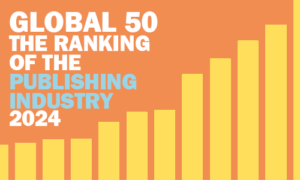
The Global 50 Publishing Ranking 2024 provides a deep dive into today’s international book industry, using many of the world’s leading publishers as examples. The companies listed generate over 60 billion euros in revenue – more than half of the global publishing market value.
Since its first edition in 2007, the Global 50 Publishing Ranking has provided a comprehensive and in-depth annual overview of the global book business, with a ranking of the industry leaders, analysis of key trends and strategic developments, and detailed company profiles, rich with key data on financials, mergers and acquisitions, structural business developments such as changes in top management, corporate restructuring, and digital and AI-related innovations.
The report reflects surprising continuities and profound shifts in an industry that is experiencing highly dynamic consolidation as well as transformative forces that are radically reshaping business and distribution models for consumer books, educational materials, and scholarly and professional information services.
The Global 50 Publishing Ranking is researched by Ruediger Wischenbart Content and Consulting and published by leading international book industry publications, including Publishers Weekly (USA), The Bookseller (UK), Livres Hebdo (France), dpr Digital Publishing Report (Germany) and Bookdao (China).
The Ranking is supported by Bookwire.
Today, book publishing has become a true part of the global content business. Yet books have retained a unique quality because publishing has created the most diverse manifestations of what can be neatly summed up by those 4 letters – B O O K:
Books can be printed on paper, listened to on a smartphone, packaged as an educational course, subscribed to as a globally branded academic journal, or snacked on as a serialized animated story. Books are embraced by audiences in multiple formats, physical or digital, picked up in a bookstore or on an online platform, presented by a small but highly creative independent press or by a global publishing conglomerate.
The Publishing Ranking 2024 documents and analyses this industry in a comprehensive global perspective.
Global 50 CEO Talk 2024 at Frankfurt
Simon & Schuster's Global Expansion and Digital Transformation Spotlighted at Global 50 CEO Talk 2024

Prominent Guest Speakers, Jonathan Karp, CEO of Simon & Schuster and Richard Sarnoff, Chairman of Media for KKR's Private Equity platform in the Americas to discuss Simon & Schuster’s Strategic Vision and Growth Opportunities at the Frankfurt Book Fair’s Premier Industry Event
The Global 50 CEO Talk 2024, held in partnership with the Frankfurt Book Fair, will take place on Wednesday, October 16, 2024, from 14.00 to 15.00 at the International Stage (between halls 4.1 and 5.1). The session will explore the strategic vision of Simon & Schuster, the iconic global publishing company celebrating its 100th anniversary. Jonathan Karp will highlight Simon & Schuster’s evolving role as a global publishing powerhouse, expanding its reach internationally while embracing digital transformation and innovation in publishing.
Simon & Schuster, acquired by KKR in 2023, continues to grow its global footprint, with recent acquisitions of leading Dutch publisher Veen Bosch & Keuning (VBK) and Australian publisher Affirm Press, marking its international ambitions. As the company continues to diversify across print and digital channels, Karp will explore the opportunities and challenges of scaling internationally and how Simon & Schuster is positioning itself for sustained growth.
Richard Sarnoff, Chairman of the Board of Simon & Schuster and long-time KKR investor and former senior publishing industry executive, will provide additional context on Simon & Schuster’s successful transition under new ownership and how the company is poised to lead in both established markets and new growth areas within the evolving publishing landscape.
Jonathan Karp and Richard Sarnoff will be interviewed live on stage by the editors of by Bookdao (PR China), The Bookseller (UK), dpr – Digital Publishing Report (Germany), Livres Hebdo (France) and Publishers Weekly (US) in a conversation moderated by Rüdiger Wischenbart.
The Global 50 CEO Talk is prepared in conjunction with the Global 50 Publishing Ranking, which has mapped the 50 largest publishing corporations each year since 2007. The world’s 50 largest publishing companies included in the latest ranking report generated publishing revenues of over 60 bnEUR (65 bnUSD) in 2023. The ranking has been researched and updated annually since 2007 by Ruediger Wischenbart Content and Consulting.
The Global 50 Ranking and CEO Talk are supported by Bookwire (www.bookwire.de).
The full Global 50 report, with the big list, an analysis and data-rich company profiles will be available as a digital publication of around 250 pages from late September 2024 at www.wischenbart.com/ranking.
About Jonathan Karp:
Jonathan Karp, Chief Executive Officer of Simon & Schuster, leads the company’s numerous publishing groups as well as its international companies in Australia, Canada, India, and the United Kingdom. Karp first joined Simon & Schuster in June 2010 as publisher of the company’s flagship imprint, and was named President and Publisher of Simon & Schuster Adult Publishing in 2018. Prior to joining Simon & Schuster, Karp was Publisher and Editor in Chief of Twelve, an imprint of Hachette Book Group, which he founded in 2005, following his tenure as Editor in Chief of Random House, where he began his publishing career. Karp serves on the Board of Directors of the Association of American Publishers and the Advisory Board of NYU’s Center for Publishing and Applied Literary Arts.
About Richard Sarnoff
Richard Sarnoff, Chairman of the Simon & Schuster Board of Directors, brings a wealth of experience in publishing, media, and education. His illustrious career includes serving as a senior executive and Supervisory Board member at Bertelsmann, where he held leadership roles both at Random House and Bertelsmann Digital Media Investments. In addition, Sarnoff served as Chairman of the Association of American Publishers during a key time in the evolution of the publishing industry as it adapted to the growth of eBooks and digital audiobooks. He currently serves as Chairman of Media within KKR’s Americas Private Equity business and in addition to the Simon & Schuster Board currently serves on the Boards of OverDrive, Teaching Strategies, Chegg, AST SpaceMobile, Lightcast, and numerous not-for-profit organizations.
Our projects in fall 2024
What is driving the global Book Business in these turbulent times? We help you to find out!

3 big research questions are framing our approaches in this year’s Global Ranking and 2 related events:
- What is driving change in the global book business?
- Why are there so many new faces in publishing leadership positions around the world?
- How big and how impactful are all these new platforms, startups, and channels from a consumer perspective?
With our reports and events this fall, we want to provide insights and solid information to back up your decision making in these turbulent times.
We plan to
- Release the Global 50 Publishing Ranking at the end of September for download from wischenbart.com, and through our partners Bookdao (China), dpr Digital Publishing Report (Germany), The Bookseller (UK), Livres Hebdo (France) and Publishers Weekly (US);
- Welcome exciting guests to the annual CEO Talk in partnership with the Frankfurt Book Fair on Wednesday, October 15; and
- Host a Global 50 Con with our German partner dpr Digital Publishing Report on November 21st, to discuss the drivers of accelerating change in the international book business.
To never miss an update on our releases, subscribe to our newsletter!
Check out as well “All About Digital Distribution“, the Digital Summit 2024 on September 19, organized by our longtime partner Bookwire.
New! >> What is “Publishing Beyond Publishers”
There is so much more going on in the international book business then what fits between two covers.
Self-publishing – platforms that target highly segmented target audiences – multi-format publishing – multi-channel distribution – serialization – readers (and listeners) who have taken on the role of book ambassadors.
There are so many ways for books to be created, produced, picked up by consumers – and devoured!
And amazingly, most of this is not represented in the book and publishing statistics and bestseller lists that we look at to make sense of our industry.
Download the full report here.

“Publishing Beyond Publishers” provides a global overview of the rapidly expanding universe of publishing models.
Most of these go well beyond the traditional value chain of authors working through traditional publishers (as gatekeepers and producers of their work).
Instead, content can be created and disseminated in a variety of formats (print, digital), media (books, audio, films, games), distribution channels (communities, platforms, streams) and business models (unit sales of products, subscriptions, streaming, freemium, paid models) in mostly digitally defined supply and marketing chains.
This study maps representative cases of these new models and adds evidence-based indicators to assess the scale of these sectors and sub-sectors.
The report has been written by Ruediger Wischenbart, with Thad McIlroy.
Global50 CEO Talk 2023
“Good Stories Never End.”
Hou Xiaonan, CEO of Tencent Corporation’s Yuewen platform, is the sole guest speaker at the Global 50 CEO Talk 2023.
The Global 50 CEO Talk 2023, held in partnership with the Frankfurt Book Fair on Wednesday, October 18, 2023, from 14.00 to 15.00 in the Frankfurt Pavilion, will explore how Yuewen is expanding literary story telling into a dynamic ecosystem which includes reading, comics and animation, film and television, games and much more.
Yuewen is the online platform for writing and reading in China’s Tencent corporation, a multinational technology and entertainment group headquartered in Shenzhen. It currently serves over 10 millions writers and over 200 million monthly active users, hosting over 10 millions literary works, and reporting annual revenues of 7.63 billion Chinese Yuan (958 million Euros or 1.05 billion US Dollars).
Founded two decades ago under the iconic brand name of Qidian, it preceded platforms such as Wattpad or Kindle Direct Publishing, pioneering a digital universe for story telling in all its facets.
About Hou Xiaonan:
Mr. Hou Xiaonan joined Yuewen in April 2020 and currently serves as its Chief Executive Officer, President and Executive Director, responsible for the strategic planning and business operation. Mr. Hou also serves as the Vice President of the Platform and Content Group of Tencent and the Head of Tencent Animation and Comics. Mr. Hou joined Tencent in 2003 and has held various management positions for Tencent businesses including Mobile QQ, Qzone, Tencent Open Platform, YingYongBao, Qingteng and Penguin Media Content Platform, acting as a core figure in Tencent’s open ecosystem strategy. He has extensive and in-depth management experience in product operation, business model innovation, and ecosystem cooperation.

The Global 50 CEO Talk is prepared in conjunction with the Global 50 Publishing Ranking of the publishing industry, mapping the 50 largest publishing corporations each year since 2007.
This ranking is listing the world’s 50 largest publishing companies, who in 2022 generated publishing revenues of 62.6 bnEUR (70.9 bnUSD).
The Global 50 Publishing Ranking is researched by Ruediger Wischenbart Content and Consulting, and published by Bookdao (PR China), The Bookseller (UK), buchreport (Germany), Livres Hebdo (France) and Publishers Weekly (US).
The Global 50 Ranking and CEO Talk are supported by Bookwire (www.bookwire.de )
The full Global 50 report, with the big list, an analysis and data rich company profiles will be available as a digital publication of around 250 pages from mid October 2023 at www.wischenbart.com/ranking , and at websites of Bookwire, Bookdao, Livres Hebdo and Publishers Weekly.
- 1
- 2



